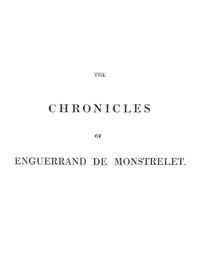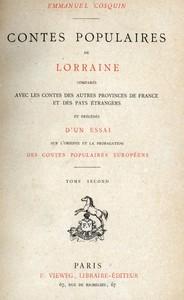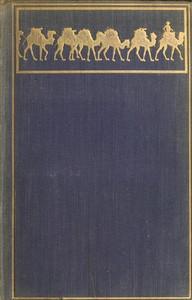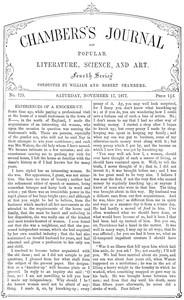Read this ebook for free! No credit card needed, absolutely nothing to pay.
Words: 11975 in 2 pages
This is an ebook sharing website. You can read the uploaded ebooks for free here. No credit cards needed, nothing to pay. If you want to own a digital copy of the ebook, or want to read offline with your favorite ebook-reader, then you can choose to buy and download the ebook.


: The Chronicles of Enguerrand de Monstrelet Vol. 01 [of 13] Containing an account of the cruel civil wars between the houses of Orleans and Burgundy of the possession of Paris and Normandy by the English their expulsion thence and of other memorable events
Editor: Unknown
HARPER'S
NEW MONTHLY MAGAZINE.
NAPOLEON BONAPARTE.
BY JOHN S.C. ABBOTT.
Early in July, 1796, the eyes of all Europe were turned to Mantua. Around its walls these decisive battles were to be fought which were to establish the fate of Italy. This bulwark of Lombardy was considered almost impregnable. It was situated upon an island, formed by lakes and by the expansion of the river Mincio. It was approached only by five long and narrow causeways, which were guarded by frowning batteries. To take the place by assault was impossible. Its reduction could only be accomplished by the slow, tedious, and enormously expensive progress of a siege.
Napoleon, in his rapid advances, had not allowed his troops to encumber themselves with tents of any kind. After marching all day, drenched with rain, they threw themselves down at night upon the wet ground, with no protection whatever from the pitiless storm which beat upon them. "Tents are always unhealthy," said Napoleon at St. Helena. "It is much better for the soldier to bivouac in the open air, for then he can build a fire and sleep with warm feet. Tents are necessary only for the general officers who are obliged to read and consult their maps." All the nations of Europe, following the example which Napoleon thus established, have now abandoned entirely the use of tents. The sick, the wounded, the exhausted, to the number of fifteen thousand, filled the hospitals. Death, from such exposures, and from the bullet and sword of the enemy, had made fearful ravages among his troops. Though Napoleon had received occasional reinforcements from France, his losses had kept pace with his supplies, and he had now an army of but thirty thousand men with which to retain the vast extent of country he had overrun, to keep down the aristocratic party, ever upon the eve of an outbreak, and to encounter the formidable legions which Austria was marshaling for his destruction. Immediately upon his return from the south of Italy, he was compelled to turn his eyes from the siege of Mantua, which he was pressing with all possible energy, to the black and threatening cloud gathering in the North. An army of sixty thousand veteran soldiers under General Wurmser, an officer of high renown, was accumulating its energies in the wild fastnesses of the northern Alps, to sweep down upon the French through the gorges of the Tyrol, like a whirlwind.
About sixty miles north of Mantua, at the northern extremity of Lake Garda, embosomed among the Tyrolean hills, lies the walled town of Trent. Here Wurmser had assembled sixty thousand men, most abundantly provided with all the munitions of war, to march down to Mantua, and co-operate with the twenty thousand within its walls in the annihilation of the audacious foe. The fate of Napoleon was now considered as sealed. The republicans in Italy were in deep dismay. "How is it possible," said they, "that Napoleon, with thirty thousand men, can resist the combined onset of eighty thousand veteran soldiers?" The aristocratic party were in great exultation, and were making preparations to fall upon the French the moment they should see the troops of Napoleon experiencing the slightest reverse. Rome, Venice, Naples began to incite revolt, and secretly to assist the Austrians. The Pope, in direct violation of his plighted faith, refused any further fulfillment of the conditions of the armistice, and sent Cardinal Mattei to negotiate with the enemy. This sudden development of treachery, which Napoleon aptly designated as a "Revelation," impressed the young conqueror deeply with a sense of his hazardous situation.
The sun had now gone down, and gloomy night brooded over the agitated camp. But not an eye was closed. Under cover of the darkness every one was on the alert. The platforms and gun carriages were thrown upon the campfires. Tons of powder were cast into the lake. The cannon were spiked and the shot and shells buried in the trenches. Before midnight the whole army was in motion. Rapidly they directed their steps to the western shore of Lake Garda, to fall like an avalanche upon the division of Quasdanovich, who dreamed not of their danger. When the morning sun arose over the marshes of Mantua, the whole embattled host, whose warlike array had reflected back the beams of the setting sun, had disappeared. The besieged, who were half famished, and who were upon the eve of surrender, as they gazed, from the steeples of the city, upon the scene of solitude, desolation, and abandonment, could hardly credit their eyes. At ten o'clock in the morning, Quasdanovich was marching quietly along, not dreaming that any foe was within thirty miles of him, when suddenly the whole French army burst like a whirlwind upon his astonished troops. Had the Austrians stood their ground they must have been entirely destroyed. But after a short and most sanguinary conflict they broke in wild confusion, and fled. Large numbers were slain, and many prisoners were left in the hands of the French. The discomfited Austrians retreated to find refuge among the fastnesses of the Tyrol, from whence they had emerged. Napoleon had not one moment to lose in pursuit. The two divisions which were marching down the eastern side of the lake, heard across the water the deep booming of the guns, like the roar of continuous thunder, but they were entirely unable to render any assistance to their friends. They could not even imagine from whence the foe had come, whom Quasdanovich had encountered. That Napoleon would abandon all his accumulated stores and costly works at Mantua, was to them inconceivable. They hastened along with the utmost speed to reunite their forces, still forty thousand strong, at the foot of the lake. Napoleon also turned upon his track, and urged his troops almost to the full run. The salvation of his army depended upon the rapidity of his march, enabling him to attack the separated divisions of the enemy before they should reunite at the foot of the mountain range which separated them. "Soldiers?" he exclaimed, in hurried accents, "it is with your legs alone that victory can now be secured. Fear nothing. In three days the Austrian army shall be destroyed. Rely only on me. You know whether or not I am in the habit of keeping my word."
Regardless of hunger, sleeplessness, and fatigue, unincumbered by baggage or provisions, with a celerity, which to the astonished Austrians seemed miraculous, he pressed on, with his exhausted, bleeding troops, all the afternoon and deep into the darkness of the ensuing night. He allowed his men at midnight to throw themselves upon the ground an hour for sleep, but he did not indulge himself in one moment of repose. Early in the morning of the 3d of August, Melas, who but a few hours before had heard the thunder of Napoleon's guns, over the mountains and upon the opposite shore of the lake, was astonished to see the solid columns of the whole French army marching majestically upon him. Five thousand of Wurmser's division had succeeded in joining him, and he consequently had twenty-five thousand fresh troops drawn up in battle array. Wurmser himself was at but a few hours' distance, and was hastening with all possible speed to his aid, with fifteen thousand additional men. Napoleon had but twenty-two thousand with whom to meet the forty thousand whom his foes would thus combine. Exhausted as his troops were with the Herculean toil they had already endured, not one moment could be allowed for rest. It was at Lonato, in a few glowing words he announced to his men their peril, the necessity for their utmost efforts, and his perfect confidence in their success. They now regarded their young leader as invincible, and wherever he led they were prompt to follow. With delirious energy, they rushed upon the foe. The pride of the Austrians was roused and they fought with desperation. The battle was long and bloody. Napoleon, as cool and unperturbed as if making the movements in a game of chess, watched the ebb and the flow of the conflict. His eagle eye instantly detected the point of weakness and exposure. The Austrians were routed and in wild disorder took to flight over the plains, leaving the ground covered with the dead, and five thousand prisoners and twenty pieces of cannon in the hands of the victors. Junot, with a regiment of cavalry, dashed at full gallop into the midst of the fugitives rushing over the plain, and the wretched victims of war were sabred by thousands and trampled under iron hoofs.
The battle raged until the sun disappeared behind the mountains of the Tyrol, and another night, dark and gloomy, came on. The groans of the wounded and of the dying, and the fearful shrieks of dismembered and mangled horses, struggling in their agony, filled the night air for leagues around. The French soldiers, utterly exhausted, threw themselves upon the gory ground by the side of the mutilated dead, the victor and the bloody corpse of the foe reposing side by side, and forgot the horrid butchery in leaden sleep. But Napoleon slept not. He knew that before the dawn of another morning, a still more formidable host would be arrayed against him, and that the victory of to-day might be followed by a dreadful defeat upon the morrow. The vanquished army were falling back to be supported by the division of Wurmser, coming to their rescue. All night long Napoleon was on horseback, galloping from post to post, making arrangements for the desperate battle to which he knew that the morning sun must guide him.
Four or five miles from Lonato, lies the small walled town of Castiglione. Here Wurmser met the retreating troops of Melas, and rallied them for a decisive conflict. With thirty thousand Austrians, drawn up in line of battle, he awaited the approach of his indefatigable foe. Long before the morning dawned, the French army was again in motion. Napoleon, urging his horse to the very utmost of his speed, rode in every direction to accelerate the movements of his troops. The peril was too imminent to allow him to intrust any one else with the execution of his all-important orders. Five horses successively sank dead beneath him from utter exhaustion. Napoleon was every where, observing all things, directing all things, animating all things. The whole army was inspired with the indomitable energy and ardor of their young leader. Soon the two hostile hosts were facing each other, in the dim and misty haze of the early dawn, ere the sun had arisen to look down upon the awful scene of man's depravity about to ensue.
Free books android app tbrJar TBR JAR Read Free books online gutenberg
More posts by @FreeBooks

: Contes populaires de Lorraine comparés avec les contes des autres provinces de France et des pays étrangers volume 2 (of 2) by Cosquin Emmanuel - Tales France Lorraine; Folklore France Lorraine; Folk literature French France Lorraine Themes motives FR Co


: The story of my struggles: the memoirs of Arminius Vambéry Volume 2 by V Mb Ry Rmin - Vámbéry Ármin 1832-1913






